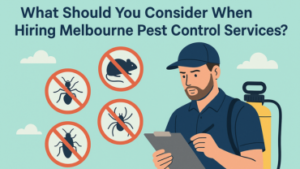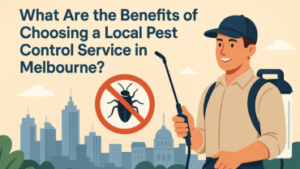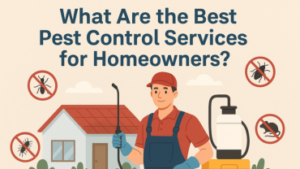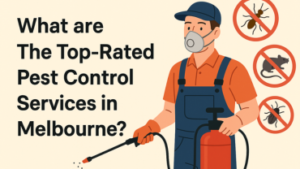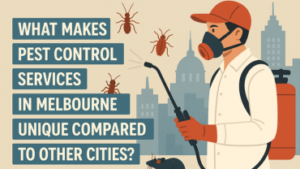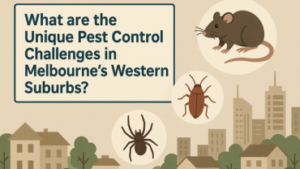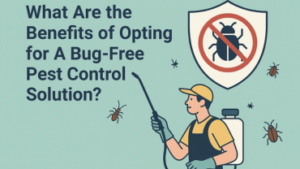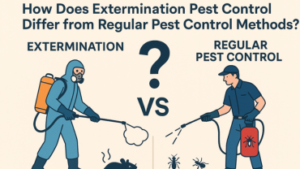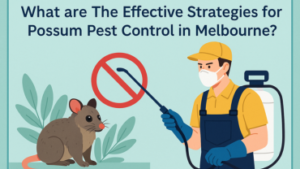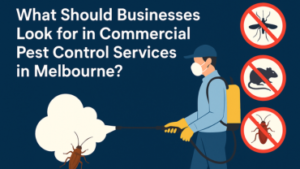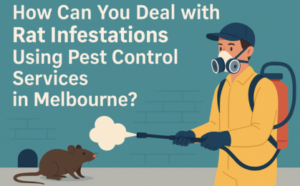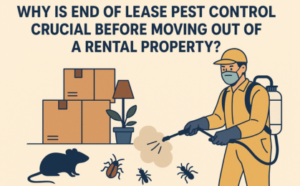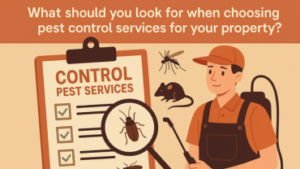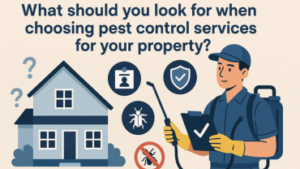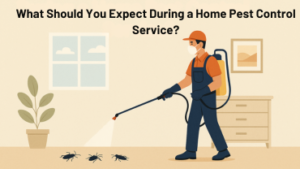Nobody likes uninvited guests, especially the creepy, crawly kind.
Whether it’s ants marching through your kitchen, spiders lurking in corners, or termites silently eating away at your home’s structure, pests are more than just a nuisance, they’re a threat to your peace of mind. But before you rush into hiring a pest control service, there’s one crucial question you need to answer: how much should pest control cost?
Pricing isn’t just about the cheapest option, it’s about value, effectiveness, and long-term protection.
This guide will break down everything you need to know, from what influences pricing to how to spot a fair deal. By the end, you’ll be equipped to make a smart, informed decision that keeps pests (and budget stress) at bay.
Understanding Pest Control Pricing: What Really Drives the Cost?
When it comes to pest control, prices can feel like a mystery. One company quotes $200, another $500, for what seems like the same service. The truth is, several key factors determine how much should pest control cost, and understanding them will help you avoid overpaying or falling for subpar service.
1. Type of Pest: Not All Critters Are Priced the Same
A termite colony could require more than a simple spray for a few wandering cockroaches. That is a whole different situation. Certain pests, such as termites and bed bugs, need more expensive specialised treatments since they require additional chemicals, tools, and knowledge. However, common domestic pests like spiders and ants typically fall into a more affordable category.
2. Severity of Infestation: The Bigger the Problem, The Higher the Cost
A single wasp nest removal is far cheaper than an entire property fumigation. If pests have been breeding unchecked for months, expect a more intensive (and expensive) treatment. This is why early detection is key, ignoring the problem only makes it worse (and pricier).
3. Property Size and Layout: More Space, More Chemicals, More Labor
Treating a small apartment is quicker and cheaper than securing a sprawling suburban home. Multi-level houses, basements, and crawl spaces add complexity, increasing labour time and material costs. If you’ve got a large yard or garden, that may also require additional treatment.
4. Treatment Method: Chemicals, Traps, or Heat?
Standard chemical sprays are usually the most affordable, but eco-friendly or non-toxic alternatives may come at a premium. Heat treatments for bed bugs, for example, are highly effective but cost more due to the specialised equipment required. Always ask about the best method for your situation, not just the cheapest.
5. Location and Accessibility: Urban vs. Rural Pricing
If you live in a major city, you’ll likely have more competitive pricing due to higher competition among pest control companies. Rural areas may see added travel fees. Additionally, hard-to-reach infestations (think: roof voids, tight attic spaces) can drive up labour costs.
Average Pest Control Costs in Australia: What’s a Fair Price?
Now that we’ve covered the variables, let’s talk real numbers.
How much should pest control cost in Australia? Here’s a detailed breakdown of what you can expect to pay for common services:
| Service | Average Cost (AUD) | Key Factors Affecting Price |
|---|---|---|
| General Pest Spray (Ants, Spiders, Cockroaches) | $150 – $300 | Property size, infestation level |
| Termite Inspection | $250 – $350 | Includes detailed report, accessibility |
| Rodent Removal (Mice/Rats) | $200 – $500 | Number of entry points, follow-ups needed |
| Bed Bug Treatment (Chemical or Heat) | $300 – $600 | Method used, room size |
| Full Home Pest Barrier (Preventative) | $1,000 – $2,500 | Property size, type of barrier |
Prices can vary based on your location and the company’s reputation. Always get multiple quotes, but remember, the cheapest option isn’t always the best. A low price could mean cut corners, weak chemicals, or no warranty.
How to Avoid Overpaying for Pest Control: Smart Tips for Homeowners
Nobody wants to waste money, especially on something as essential as pest control. Here’s how to ensure you’re getting a fair deal without sacrificing quality:
1. Get Multiple Quotes (But Don’t Just Pick the Cheapest)
Comparing at least three different companies gives you a realistic idea of how much should pest control cost in your area. But beware of prices that seem too good to be true, they usually are.
2. Check Licenses and Customer Reviews
A licensed, insured pest controller with strong reviews is always a safer bet than an unknown cheap service. Look for real testimonials and before/after case studies.
3. Ask About Service Guarantees
A reputable company will offer a warranty, meaning if pests return within a certain period, they’ll retreat at no extra cost. This is a sign of confidence in their work.
4. Understand Exactly What’s Included
Does the price cover follow-up visits? Are there hidden fees for difficult access areas? Always clarify the scope before committing.
How Delaying Treatment Inflates Prices
That suspicious rustling in your walls or occasional ant trail might seem harmless now, but pests multiply fast. What starts as a minor issue can quickly become a full-blown infestation, and with it, your treatment costs skyrocket.
How much should pest control cost when you wait too long?
Often 2–3 times more than early intervention.
1. Structural Damage = Bigger Bills
Termites silently eating your home’s frame? Each month delayed means thousands in extra repairs. A $500 termite barrier now could prevent $15,000 in structural damage later.
2. Breeding Colonies Demand Heavy-Duty Treatments
A few cockroaches can become hundreds in weeks. Larger infestations require stronger chemicals, multiple visits, and sometimes even fumigation—all adding to your final bill.
3. Health Risks Raise the Stakes
Rodents and cockroaches spread diseases. Letting them linger risks medical costs on top of extermination fees, especially if mould or allergens develop from pest waste.
4. Lost Time and Stress
Severe infestations may force you to vacate your home during treatment. Hotel stays, food spoilage, and missed work all add hidden costs to procrastination.
Negotiation Secrets: How to Get the Best Pest Control Deal Without Sacrificing Quality
Pest control is a competitive industry, use that to your advantage! With the right approach, you can secure fair pricing while still getting top-tier service. Here’s how to master the art of the deal when determining how much should pest control cost:
1. Leverage Competing Quotes
Politely mention lower offers from rivals: “Company X quoted $100 less—can you match or explain the difference?” Many will adjust pricing to win your business.
2. Ask About Off-Peak Discounts
Winter is slow for pest control. Booking termite inspections or preventative sprays in colder months can score you 10–20% off.
3. Bundle Services for Package Deals
Need both rodent removal and a general spray? Bundling often unlocks discounts. Example: “If I book the annual barrier and one-time ant treatment together, can we adjust the total?”
4. Inquire About Loyalty Programs
Many companies offer discounts for repeat customers or referrals. Even a first-time client can ask: “Do you have any new-customer promotions?”
5. Negotiate the Scope (Not Just Price)
If a quote seems high, ask if reducing service areas (e.g., treating only the basement now, not the whole house) could lower costs without compromising results.
DIY vs. Professional Pest Control: When to Call the Experts
DIY Pest Control: The Quick Fix (But Not Always the Best Fix)
- Cheap upfront, costly long-term? That $10 spray may hide the problem, not solve it.
- Guesswork vs. precision – You spray where you see pests, but pros target where they live.
- Temporary relief – Bugs often come back stronger if the nest isn’t fully eliminated.
- Safety risks – Overusing store-bought chemicals can harm pets, kids, or even you!
Professional Pest Control: The Smart Investment
- Stronger, targeted treatments – Pros use industrial-grade solutions that actually work.
- Hidden nests? No problem – They know where pests hide (walls, attics, underground).
- Long-term prevention – Stop infestations before they become disasters.
- Cost-effective? Think about it: How much should pest control cost if it saves you from endless DIY fails and property damage?
Final Thoughts: Getting the Best Value for Your Pest Control Needs
Pest control isn’t just an expense; it’s an investment in your home’s safety and your family’s comfort. By understanding the factors that influence pricing, comparing quotes wisely, and choosing a trusted provider, you can ensure you’re getting real value for your money.
Ready to Take Back Your Home?
At Chris Pest Control, we believe in honest pricing, expert service, and lasting results. Don’t let pests take over, contact us today for a free, no-obligation quote and let’s get your home pest-free for good!

